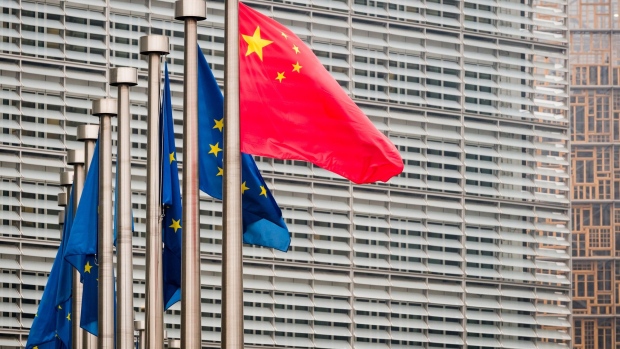Feb 6, 2023
Eight-Week Wait for Visas to Europe Slows China’s Reopening
, Bloomberg News

(Bloomberg) -- China’s rapid dismantling of Covid restrictions caught some embassies and consulates in the country off guard and understaffed, leading to complications in issuing visas and delaying the resumption of international business activity.
Joerg Wuttke, head of the European Union Chamber of Commerce in China, said some Chinese executives are waiting as long as six to eight weeks to get business visas to travel to Europe. Prior to the pandemic, typical applications could be completed sometimes in a matter of days.
Schengen-area countries are most affected, in particular Germany — which counts China as a key trading partner. At least two leading foreign business groups in China have called for a return to systems and processes used before the pandemic. Chinese tourists wishing to travel to Europe have also faced visa delays, forcing some to cancel or rearrange plans.
Wuttke attributed the bottlenecks with German visa approvals to a lack of resources to handle a spike in demand. “They simply have no staffing to actually cope with the introduction again,” he said.
Compounding matters, China’s Covid policy reversal coincided with Christmas and especially the Lunar New Year holiday, when businesses largely shut down as workers return to their hometowns. Many millions hadn’t been able to travel home during the years of restrictions.
Hong Kong-China Border Set to Reopen as City Aims to Rebuild
Some countries outsource extensive elements of their visa handling to companies like VFS Global, BLS International and TLScontact. Several of those scaled back operations during the years of Covid curbs, when demand for international travel was almost non-existent.
A spokesperson at the German embassy in Beijing cited closures of VFS centers “for almost three years” when explaining the delays. “Reopening of the centers at each location requires thorough preparation,” he said, outlining that Beijing operations should be ready to restart in mid-February.
With China still imposing Covid-related entry requirements, Germany is reciprocating with steps of its own, including a rule for travelers from the Asian country to take Covid tests. The embassy spokesman said tourism trips from China to Germany aren’t permitted. Last month, Germany advised against nonessential travel to China due to the number of infections in the country.
Members of the German community in China including one auto industry executive complain that paperwork to secure German visas has become too onerous. The German Chamber of Commerce’s North China executive director, Jens Hildebrandt, said German companies in China suffer a competitive disadvantage because applicants need to prove that business trips are absolutely necessary and explain why they cannot be achieved remotely.
“Previous to the pandemic this was not the case,” he said. “German businesses urgently need to send Chinese employees to Germany and hope for the German Foreign Ministry to reinstate the pre-pandemic visa process as soon as possible.”
A VFS Global spokesperson said the company only manages the administrative and non-judgmental aspects of the visa application process.
“Decisions on visa applications, including the availability of appointment slots and the timelines to process them, are at the sole discretion of the respective client governments and may vary from one mission to another,” the spokesperson said, adding that visa processing “can take longer than anticipated” during peak season.
The drop in visa applications during the pandemic prompted VFS to “restructure some of our visa application centers,” including temporary closure “of a few,” according to the company.
BLS International and TLScontact didn’t respond to requests for comment.
A 35-year-old business development executive surnamed Guan said she struggled to get an appointment at a privately-run visa-processing center in Shanghai as it is only accepting bookings on two mornings a week.
It wasn’t possible to see appointment availability for some countries in real time, Guan said. Instead, would-be applicants have to email a designated address, giving details of their trip and wait to be informed of available slots. “It’s rather a vintage way of doing business,” she said.
China Presses Students to Head Back to Overseas Universities
The visa delays are impacting business plans. The head of a firm that introduces Chinese companies to opportunities in Scandinavia told Bloomberg News that an investment trip for a client may have to be canceled because his team are still trying to get business visas. He asked for anonymity because of the sensitive stage of negotiations between his company and the host Nordic country, which he also didn’t specify.
Wang, an entrepreneur in Xi’an, is worried about getting a visa ahead of a conference in Spain in March. He only managed to secure a slot for a France-issued Schengen visa, and will need to make a 1,200-kilometer (745 miles) trip from his hometown to Beijing to submit an application.
“We have to be fast in restarting the process first for business people to travel, as that really generates jobs and trade,” Wuttke of the European Chamber said. “Secondly, we have to start again the visa process for tourism — on both the European and Chinese sides — in order to give people the chance to reconnect again with our regions.”
--With assistance from Zibang Xiao.
©2023 Bloomberg L.P.


